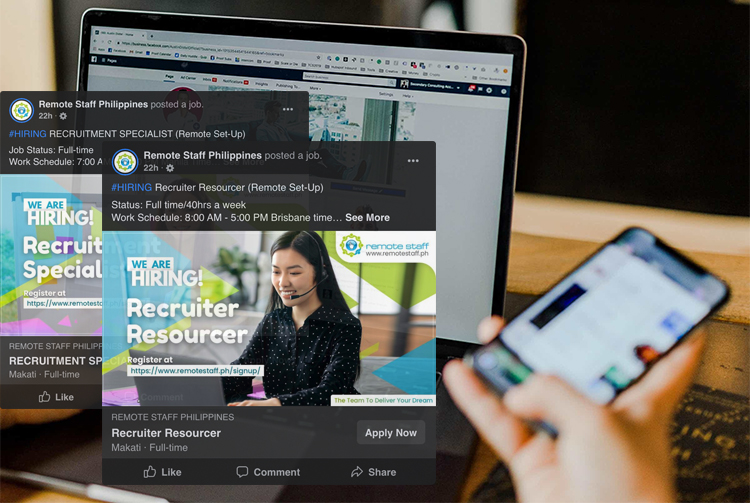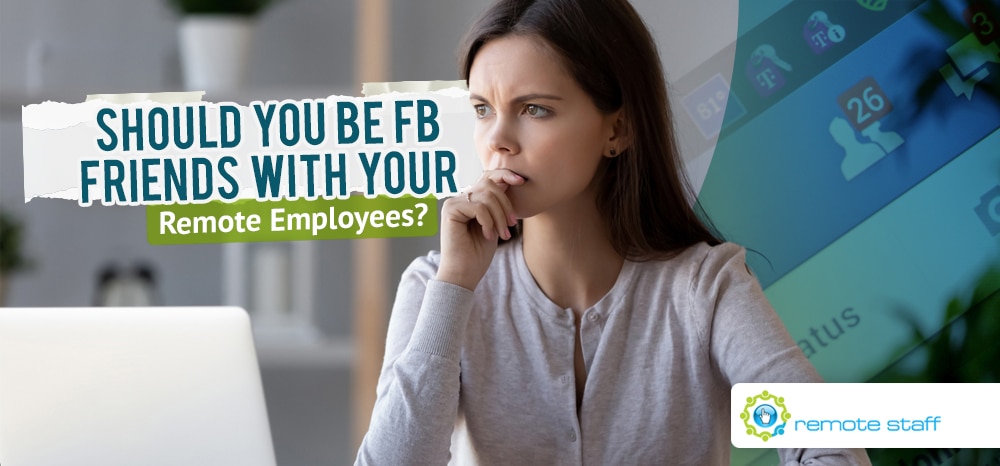We’ve always talked about the importance of maintaining good relationships with your employees. This means listening to their thoughts, being open to suggestions, and appreciating their contributions. Maintaining a good connection with your staff, after all, is key to high workplace satisfaction and low turnover.
However, where do we draw the line when socialising at work?
Today, navigating personal and professional relationships are trickier, especially now that we’re in the middle of a global pandemic. In the absence of face to face interactions, we’ve turned to social media, where the lines can quickly blur.
Hence, the endless debate on whether you should befriend your employees or not on Facebook.
If you’re still wondering whether you should accept your remote employee’s FB invite or not, we’ve listed the pros and cons of doing so to help you decide how best to proceed.
Pros
Here are the possible benefits that you could enjoy if you accepted that FB invite.
Help New Team Members Feel More Welcome

Let’s face it. Rejected or ignored friend requests can sting. This is all the more true if you’re new to the team and don’t know anyone. The same goes for your employees especially if they’re new to your team.
Hence, accepting friend requests from new employees is an easy way to make them feel welcome. If it makes you uncomfortable, you can always filter what they see on your feed. And if you’re not really active on social media anyway, there’s even less of a risk that they’ll see anything they shouldn’t.
Recruitment Assistance

Remember that social media isn’t just for selfies and life updates. Businesses can also use this platform to promote their products or services and even announce job vacancies. Hence, if you’re friends with your employees on Facebook, they can help share news of any vacancies to improve your reach and help you fill these faster.
Furthermore, they can also post their personal experiences working with your company. Many candidates check the Facebook pages of companies they’re considering applying to. Positive reviews from past and present employees might just tip the balance in your favor, so to speak.
Sharing Values

Many organisations attribute their success to shared values with their customers, clients, and employees. Hiring team members who value the same things can certainly help create such an inclusive work environment.
When you’re friends with your employees on Facebook, it will be easy for them to see what matters to you. For example, constantly sharing articles about award-winning marketing ideas and catchy advertising campaigns can give the impression that you value excellence and innovation at your job (and by extension, theirs).
Just don’t forget to filter the audiences on your more personal posts so that you maintain a professional image, of course.
Cons
Now, what could possibly go wrong if you do accept your remote employee’s FB invite? Here are a few:
Heightened Potential For Conflict

If you have very strong opinions on sensitive or highly polarising issues on social media, you’re probably better off ignoring that FB invite. Sure, we won’t always share the same values or opinions and that’s usually okay, but do you really want to risk stirring up a hornet’s nest?
It’s fine, healthy even, to debate about different approaches to work. Exchanging heated comments on social media over politics or something equally divisive is a different story.
Because even if what you do on Facebook shouldn’t be anyone else’s business, your employees can still see your interactions and comments. And this can still affect how they view you at work.
Lack of Privacy

Would you be comfortable with your remote workers seeing your drunk photos? How about if they comment on a silly or sultry selfie? Yeah, me neither.
Also, do you really want to read your employee’s rants after a long and exhausting week at work? Sometimes, people get careless and forget to filter their posts. As a result, their bosses inadvertently find out how annoyed they really are when asked to constantly revise their work or something like that.
So, if you’re the sort of person who gets affected by what others say, best to keep your FB account private.
Data Security Issues

Let’s say you’re careful about what you share or upload on your social media platforms. Can you say the same about any employee who adds or follows you?
Many employment lawyers warn against connecting with staff on Facebook due to the possibility of a security breach. Furthermore, in extreme cases, employees accuse their managers of unjust termination based on their medical history, political preferences, or even lifestyle choices based on their channels.
Sure, these accusations are often baseless, but they could have been easily avoided if neither party connected on social media.
Recommendations

There are many other reasons for accepting (or deleting) a remote employee’s friend request. Whatever you choose, it should always honor the boundaries between your personal and professional lives.
By the way, it helps to maintain a respectable social media presence, and not just because your employees might be checking you out. Many potential clients can also view your posts, so think twice before you upload anything. (Alternatively, you can also maintain a separate account that’s just for close friends and family.)
Remote Staff has been providing Australian SMEs and entrepreneurs like you with skilled and professional remote workers from the Philippines for the last 14 years and counting. We also facilitate the onboarding process so you won’t need to hunt them down on Facebook just to keep tabs on them.
Call us today or schedule a call back and let’s get started.
Serena has been working remotely and writing content for the better part of the last decade. To date, she's written for Pepper.ph and Mabuhay Magazine, among others, and has churned out more than a thousand articles on everything from The Basics of Stock Market Investing to How to Make Milk Tea-Flavored Taho at home. Hermits, aspiring hermits, and non-hermits with interesting project propositions may email her at serena.estrella10@gmail.com.
























 Zero Recruitment Fee
Zero Recruitment Fee